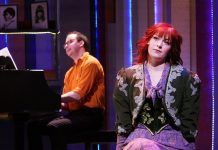Orlando, WSC Avant Bard’s upcoming production, is based on Virginia Woolf’s classic 1928 novel in which Woolf based the character Orlando on the woman she was madly in love with. In both the book and in the play—adapted for the stage by renowned playwright Sarah Ruhl—Orlando starts out as a boy then midway through becomes a woman.

Virginia Woolf had some pretty radical notions about gender—ideas that would make perfect sense to today’s generation of gender adventurers but back then must have sounded wacko. She wrote in Orlando, for instance:
Different though the sexes are, they intermix. In every human being a vacillation from one sex to the other takes place, and often it is only the clothes that keep the male or female likeness, while underneath the sex is the very opposite of what it is above. Of the complications and confusions which thus result every one has had experience…
WSC Avant Bard’s Orlando, directed by Amber Jackson, features Acting Company members Sara Barker (as Orlando) and Jay Hardee (in several female and male supporting roles). Curious to know how Sara and Jay are playing gender in Orlando—and how they are playing with gender (as Woolf does in the novel)—I caught up with them between rehearsals.
Turns out, both Sara and Jay have performed crossed-gender parts before, including in previous WSC Avant Bard productions. So I asked them to name their faves.
Jay answered first and described his role as Camille in WSC Avant Bard’s production of Camille: A Tearjerker, written by Ridiculous Theatrical Company founder Charles Ludlam: “Camille was all about camp and high drag, inspired by [John Waters film icon] Divine. Another of my inspirations was [the reality TV show] RuPaul’s Drag Race—over-the-top, club-performance style of drag where everybody is aware that there’s a man in a dress, and there’s a wink and a nod to the audience so that we’re all in on it. We had a moment in Camille where we adjusted our tucks. So it was clearly: This is a man in drag.”
In Orlando, Jay is one of three men in the Chorus who both narrate the story and pop in and out of various characters. Among Jay’s female roles are the Archduchess and a woman named Favilla (whom Orlando romances while a boy). In this show, Jay explained, he plays gender very differently from how he performed as Camille: “It’s more real; it strives to be more real. I’m playing this woman and so I behave as her. In developing the character’s body, the character’s physicality, I think of the character’s gender—and that affects the way I play the character. But I’m not doing it with a wink and a nod to the audience.
The other day in rehearsal Amber used the word ‘earnest’—and you never associate earnestness with drag.“The three men playing the Chorus are onstage all the time. We’ll have a base costume, and add pieces on top of it. All the dressing will be done onstage, so the audience will see us donning the clothes of these new people, jumping into a new character and then jumping out. That will be part of the fun of the show: seeing the shape shifting.”
Jay shared a personal insight that as an actor he has relied on for his cross-gender roles in Orlando: “I took a class in college called “The Performance of Race and Gender,” an advanced acting seminar. The professor was a black woman who was a feminist. Her theory was that since gender and race are social constructions, anybody can play any character, regardless of their own race or ethnicity and gender, so long as they understand how race and gender are constructed. Actors can be other people because they’re constructing the other character the way they are. That’s different from the way a drag queen performs gender. Drag is more about a hyperfemininity as opposed to a performance where you’re striving to live in that other person’s body. I’m not saying the Archduchess doesn’t have a little of the drag queen in her, but that’s the character’s personality. I’ve played a lot of women in a lot of different things. Like when we [WSC Avant Bard] did Hotel Fuck, I played [the nymphomaniac] Julia Jacobson, and that was definitely over-the-top, really campy. That’s not what I want to go for with Orlando.”
Sara agreed with Jay about the directorial approach Amber Jackson is taking with Orlando: “There’s something that Amber keeps coming back to, and it’s like the sincerity of the moment that we get ourselves in as our characters.
“I also have a lot of experience playing the opposite gender, if you can call it that,” Sara continued. “The first one was playing King Lear, at The Brick theater in Brooklyn. The director had a concept of Lear being childlike, and it had all the poignancy and heartache that a 75-year-old Lear would have. I didn’t have to stretch much, because children are kind of genderless when compared to adults; they don’t have strictly defined gender roles quite yet. I play children really well, and it was easier than you might imagine. My next cross-gender role was Algernon in [Oscar Wilde’s] The Importance of Being Earnest with Scena Theatre. That was more of an outlandish switch, with a completely gender-crossed cast, an over-the-top drag king kind of thing. And for WSC Avant Bard I played Hotspur in The Mistorical Hystery of Henry (I)V [a Shakespearean mashup]. That production had elements of burlesque, and it was more drag king-y also.”

Sara then explained her cross-gender role in Orlando: “I’ll be playing a boy who’s 16 years-old at the beginning, an aristocrat in Elizabethan England. He’s a young poet, he has poetry in his heart, he wants ever so much to write a great poem—yet he can’t, because as an aristocrat he’s never had to want for anything in his life, and that prevents him from getting at the real, the sublime. So he has to live some—in this play he has to live about 500 years. He’s earnest but he’s naive. He’s also at the same time incredibly charming.”
I asked Sara how her performance as boy Orlando will differ from her other cross-gender characters. “He’s a wannabe poet,” Sara said. “And there’s something embodying that kind of heart and that kind of soul of poetry—something more grounded, more real. Maybe because Orlando is a poet, I don’t think it’s that much of a stretch, or that over-the-top, for me to be playing as a boy. I feel very close to him. Because teenagers, you know—whatever gender you identify with, you’re all going through some raging hormones. There’s a lot of insecurity that is very common to both male female gender roles as teenagers. When we meet Orlando, we get to see him through his 20s, and when he hits 30 he turns into a woman. To me, something about being a young poet always comes through. Even though Orlando talks about cracking men over the head, running them through with a sword, he’s not like Hotspur, who’s an actual warrior. There’s not a huge amount of machoism to him.”
Sara said that now and then during rehearsals she dips back into the novel Orlando for insights into her character: “We have a wealth of background information on our characters because Virginia Woolf wrote an incredible novel. Anytime I have questions about what it’s like for Orlando at this moment or that moment, I pick up the book.”
Virginia Woolf wrote of Orlando: “She was man; she was woman; she knew the secrets, shared the weaknesses of each. It was a most bewildering and whirligig state of mind to be in.”
I asked Sara what she thought Woolf would think of the times we live in now, when gender-identity change has become more common and more accepted and gender fluidity is increasingly understood as a natural aspect of everyone’s experience.
Without hesitation Sara answered: “Oh, she predicted it.”
=====
Orlando plays February 21 through March 23, 2014 at WSC Avant Bard – at Theatre on the Run – 3700 South Four Mile Run Drive, in Arlington, VA. For tickets, call the box office (703) 418-4808, or purchase them online.
For more insider insights from the WSC Avant Bard Orlando creative team, visit Director Amber Jackson’s blog.





